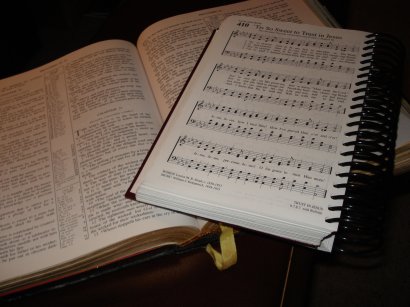
Home
Statement of Faith
Origin of Music
Purpose of Music
Uses of Music in the Church
Uses of Music Personally
The Church Music Ministry
About me
Using Music in the Church
This section examines the proper uses for music in the church. The next chapter will deal with how music has been abused in church services. The two subjects are difficult to separate in this day since modern Christianity has blurred the perceived boundaries between right and wrong. This section will focus upon the proper music to use in church and how the music is to be used.
In order to begin this discussion, the original purpose of music must be discussed. As mentioned in an earlier chapter, music was created in heaven by God. Satan was given the ability to create music as the head cherub. When one examines Scripture, the role of the cherubim in heaven is to surround the throne of God and to provide an atmosphere of worship. Apparently, one key ingredient of this worship is music. In the book of Revelation the twenty-four elders also sing praise to God. Music’s original purpose was to bring praise and glory to God.
If music’s original purpose is to glorify God, why should a church service have a different purpose? Is not one of the purposes of a church service to worship God? If the conclusion is music in a church service is to glorify and worship God, then the organizers of music in the church have a duty to confine all music within this boundary. The next few paragraphs discuss this boundary and what should be inside it and outside it.
The first task in defining what should be acceptable in church versus unacceptable in church is to dispel the notion that only the words can be wrong and that notes and rhythms are amoral. Nothing can be further from the truth and the statement is one that Satan would love for every Christian to believe. If Satan can get a Christian to believe that the melody, harmony, and rhythm without the words are neither right nor wrong, than he can get that Christian to listen to anything as long as the words are “correct”. However, the last chapter discussed how music tones and rhythm affect human beings in multiple emotional ways. Would it be acceptable to have a song in a church service with the words of Amazing Grace but with the tonality and rhythm that promotes illicit behavior? Would it be right to sing words about salvation to a tune that creates depression and misery? While Christians would hopefully say no, many do not live that way. These Christians desire to have music with “correct” words while the melody, harmony, and rhythm promote ungodly behavior.
So what should be acceptable in the church? There are two specific areas that should be examined. First, one must look at the words to ensure they are within the boundary defined below and then one must look at the tonality to ensure that is within a similar boundary.
Contact Us